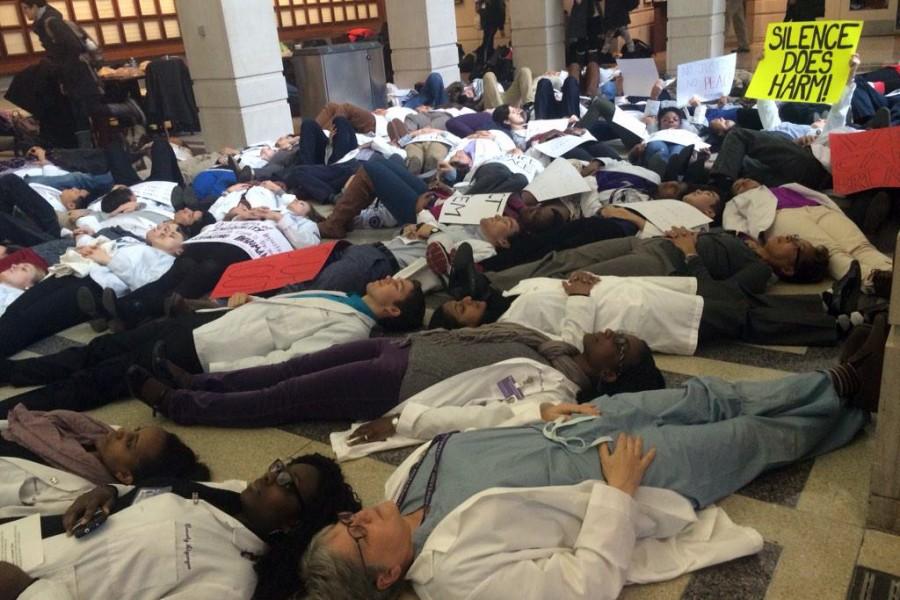Feinberg community holds ‘die-in’ protest of Brown, Garner decisions
Paige Leskin/Daily Senior Staffer
More than 100 students and faculty from Northwestern’s Feinberg School of Medicine participate in a 4.5-minute “die-in.” The protest was held in conjunction with a series of demonstrations at medical schools across the country on Wednesday.
December 11, 2014
More than 100 students and faculty from Northwestern’s Feinberg School of Medicine participated in a “die-in” demonstration on Wednesday to protest racial bias.
The protest at Feinberg’s Ward Building in Chicago was held in conjunction with a series of demonstrations at medical schools across the country on Wednesday, which was the United Nations’ Human Rights Day. Participants donned white lab coats for the protest to indicate that racial bias is a public health issue.
The events were organized in light of recent grand jury decisions in Ferguson, Missouri and Staten Island, New York not to indict police officers in the deaths of unarmed black men.
Feinberg students and faculty lay on the floor shortly after 12:30 p.m. in the building’s atrium for 4.5 minutes, symbolizing the 4.5 hours unarmed black teenager Michael Brown lay on the street after being shot and killed Aug. 9 by white police officer Darren Wilson in Ferguson.
Many held signs that read “#whitecoats4blacklives,” “First, Do No Harm” and “Homicide is a Public Health Problem.” While protesters lay on the ground, some took turns reading statistics about racial disparities in treatment by police and medical professionals.
The events in Ferguson and in Staten Island, where Eric Garner was killed after a police officer put him in a chokehold, are especially important for students training to become medical professionals because of the prevalence of institutional racism, said Feinberg student Erinma Ukoha, who helped organize the protest.
“It’s important for (students), as future physicians, for us to understand institutional and social racism,” Ukoha said. “Hopefully we can be more aware and more critical.”
Ukoha received an invitation earlier in the week to the protest’s national event on Facebook and decided to bring the demonstration to NU. After discussing the event’s feasibility with Feinberg administration, she spread word of the protest online.
Ukoha said she was satisfied with the turnout, adding that as a result of the event, other students are planning various talks to further discussion about racial bias. She also said she was particularly happy that some faculty members participated.
Feinberg Prof. Dr. Daniel Evans said he participated in the die-in both to show his support for a student-organized event and to help draw attention to a national problem.
“I think we all have implicit biases,” he said. “People being left in the street for four and a half hours puts a spotlight on a problem more pervasive than police.”
Protests have persisted nationwide in the past two and a half weeks in response to the grand juries’ decisions.
NU undergraduate students held a similar die-in demonstration on the Evanston campus in late November.
Feinberg second-year student Ian Cooke said the recent events indicate an issue of injustice that needs to be recognized. The protest showed the Feinberg community’s support and solidarity with others who have demonstrated, Cooke said.
Medical school communities across the country held similar protests, including Weill Cornell Medical College, University of California Davis School of Medicine and Harvard Medical School.
In Chicago, medical students participated in demonstrations at six different schools, including the University of Chicago Pritzker School of Medicine, Loyola University Chicago Stritch School of Medicine and University of Illinois College of Medicine.
Email: pl@u.northwestern.edu
Twitter: @paigeleskin



